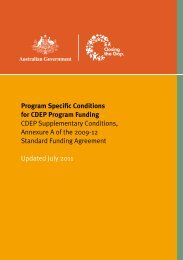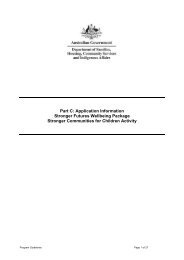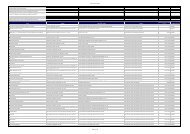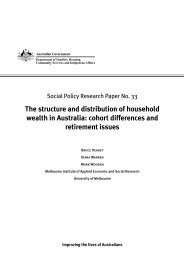pdf [5.3MB] - Department of Families, Housing, Community Services
pdf [5.3MB] - Department of Families, Housing, Community Services
pdf [5.3MB] - Department of Families, Housing, Community Services
Create successful ePaper yourself
Turn your PDF publications into a flip-book with our unique Google optimized e-Paper software.
FIGURE 3-3: PREVALENCE OF FACTORS ACROSS RECONNECT CASESSource: FaCS (2003) – original source: Statistical Report on the Longitudinal Survey <strong>of</strong> Reconnect Clients (RPRConsulting, 2003).Based on utilisation <strong>of</strong> the longitudinal client study and administrative data, some keyfindings from the Reconnect evaluation (FACS, 2003) in terms <strong>of</strong> outcomes for youth/parentswere as outlined below. The proportion <strong>of</strong> young people living in temporary situations fell from 16.5% at thestart <strong>of</strong> s upport to 5% after support. The proportion <strong>of</strong> youth living with parents increased from 57.5% to 62% from the start<strong>of</strong> support to after support, increasing in all age categories. Two thirds <strong>of</strong> youth and their parents reported overall improvement in the situation <strong>of</strong>the young person that led them to seek Reconnect, with most attributing this to theintervention. A dramatic imp rovement was reported in the ability <strong>of</strong> young people to manage familyconflict with this improvement sustained over time. The proportion <strong>of</strong> youth reportingimproved conflict management skills improved from 12% before Reconnect, to 44%after. This was found to continue for the length <strong>of</strong> the client study. The proportion <strong>of</strong> parents reporting improved conflict management skills increasedfrom 8 to 38%. Both youth and parents reported improved communication in the family. Theproportion <strong>of</strong> youth reporting good communication increased from 22% to 41%. Forparents, this increase was from 11% before Reconnect to 42% after. Young people reported as having cases <strong>of</strong> medium complexity were found to haveimproved feelings <strong>of</strong> self-worth and coping, as measured over time on objective scales. Parents were reported to feel increased closeness with their children and lessalienation after Reconnect, but the effect was not sustained over time. In terms <strong>of</strong> reducing negative school experiences, there was a reported improvementover time in the extent to which young people were reported to feel liked and respectedat school.84


![pdf [5.3MB] - Department of Families, Housing, Community Services](https://img.yumpu.com/43360016/100/500x640/pdf-53mb-department-of-families-housing-community-services.jpg)

![pdf [107kB] - Department of Families, Housing, Community Services](https://img.yumpu.com/51272499/1/190x245/pdf-107kb-department-of-families-housing-community-services.jpg?quality=85)










![Land Claim - pdf [278kB] - Department of Families, Housing ...](https://img.yumpu.com/47002639/1/184x260/land-claim-pdf-278kb-department-of-families-housing-.jpg?quality=85)

![Borroloola Land Claim - pdf [299kB] - Department of Families ...](https://img.yumpu.com/46103973/1/184x260/borroloola-land-claim-pdf-299kb-department-of-families-.jpg?quality=85)